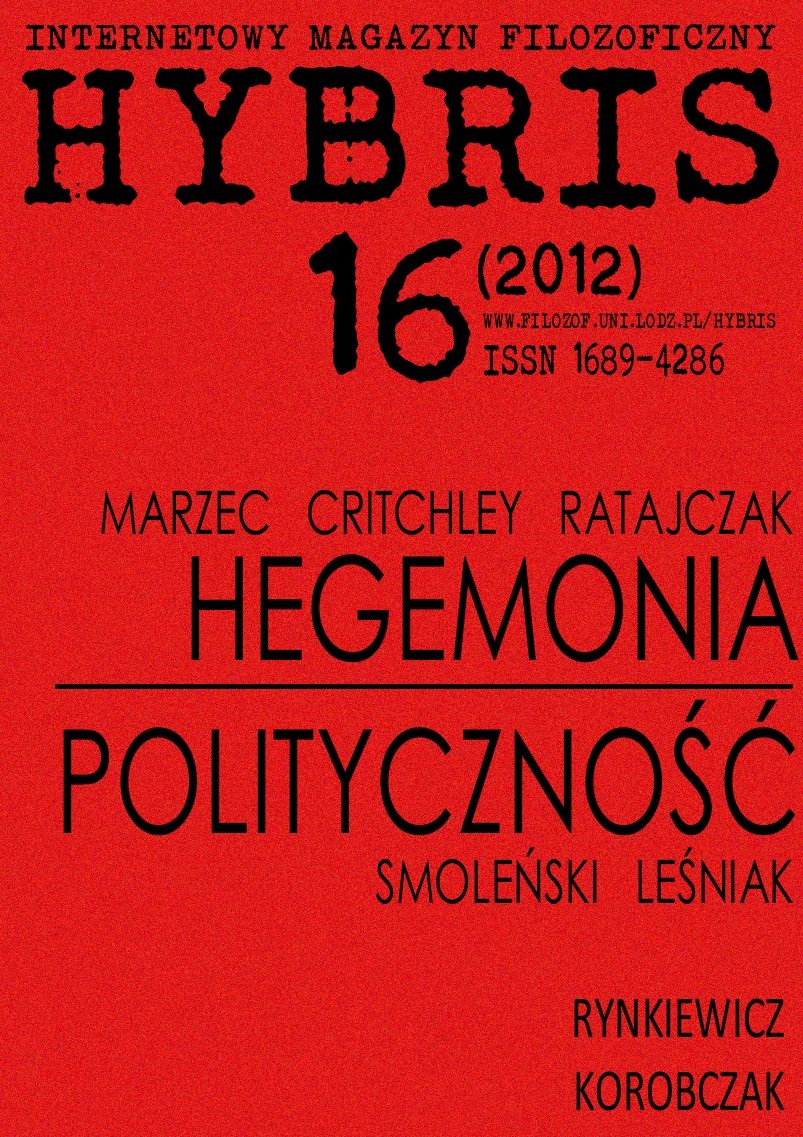Ideology, Politics and Society in Antonio Gramsci's Theory of Hegemony
DOI:
https://doi.org/10.18778/1689-4286.16.05Słowa kluczowe:
Antonio Gramsci, class reductionism, economic determinism, hegemony, Marxism, philosophy of praxisAbstrakt
In this article, I examine Antonio Gramsci's theory of hegemony by situating it in relation to a more general intellectual and socio-political context involving orthodox Marxism, October Revolution and Italian fascism. I first briefly outline the problem of economism in Marxist theory, as it is the main object of Gramsci's critique developed fully in the Prison Notebooks. The next two sections are devoted to October Revolution and Italian fascism, interpreted as two elements of the socio-political conjuncture which called into question Marx's 'base/superstructure' model of society and its mechanistic rearticulation. Finally, I discuss Gramsci's mature political theory as an attempt to break with economic determinism and class reductionism of classical and orthodox Marxist theory. I argue that his original conception of hegemony constitutes an advance towards a non-essentialist and relational conception of politics and society.
Bibliografia
Adamson, W. (1980), Gramsci's Interpretation of Fascism, [in:] „Journal of the History of Ideas”, 41 (1980).
Zobacz w Google Scholar
DOI: https://doi.org/10.2307/2709277
Femia, J. (1981), Gramsci’s Political Thought, Oxford: Clarendon Press.
Zobacz w Google Scholar
Finocchiaro, M. (1988), Gramsci and the History of Dialectical Thought, Cambridge: Cambridge University Press.
Zobacz w Google Scholar
DOI: https://doi.org/10.1017/CBO9780511624759
Gramsci, A. (1971), Selections from the Prison Notebooks of Antonio Gramsci, London: Lawrence & Wishart.
Zobacz w Google Scholar
Gramsci, A. (1977), Antonio Gramsci. Selections from Political Writings (1910-1920), London: Lawrence & Wishart.
Zobacz w Google Scholar
Howarth, D. (2000), Discourse, Buckingham: Open University Press.
Zobacz w Google Scholar
Kołakowski, L. (1978), Main Currents of Marxism. Vol. 3: The Breakdown, Oxford: Clarendon Press.
Zobacz w Google Scholar
Laclau, E. and Mouffe, Ch. (2001), Hegemony and Socialist Strategy, London - New York: Verso.
Zobacz w Google Scholar
Martin, J. (1998), Gramsci's Political Analysis, Basingstoke: Macmillan.
Zobacz w Google Scholar
Marx, K. (1996), Marx: Later Political Writings, Cambridge: Cambridge University Press.
Zobacz w Google Scholar
DOI: https://doi.org/10.1017/CBO9780511810695
Mouffe, Ch. (1979), Hegemony and ideology in Gramsci, [in:] Ch. Mouffe (ed.), Gramsci and Marxist Theory, London: Routledge & Kegan Paul.
Zobacz w Google Scholar
Paggi, L. (1979), Gramsci’s general theory of marxism, [in:] Ch. Mouffe (ed.), Gramsci and Marxist Theory, London: Routledge & Kegan Paul.
Zobacz w Google Scholar
Simon, R. (2001), Gramsci's Political Thought, London: The Electric Book Company.
Zobacz w Google Scholar
Pobrania
Opublikowane
Jak cytować
Numer
Dział
Licencja

Utwór dostępny jest na licencji Creative Commons Uznanie autorstwa – Użycie niekomercyjne – Bez utworów zależnych 4.0 Międzynarodowe.






